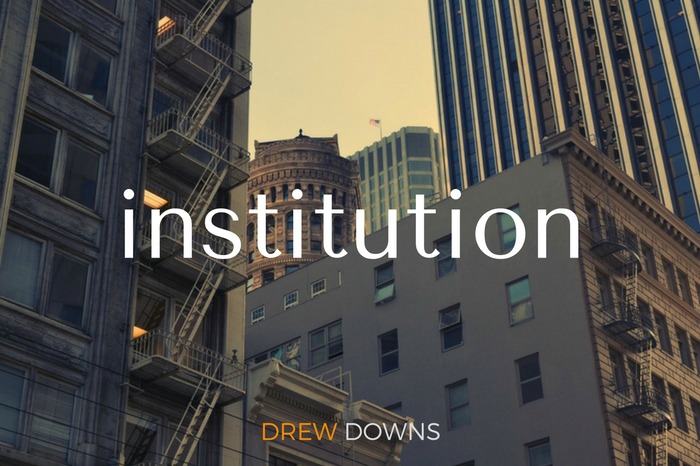We’re all anti-institutional these days
I get it. You hate institutions. You want them all to go down. Buy local. Build it up around you. Fund those things you care about. Institutions do pretty well suck. I know. I’m a member of Generation X, the generation handed anti-institutional ID cards with our latchkeys. We’ve been doing skeptical since the moment we realized we weren’t going to get what our parents got.
Which is why it’s funny to see the older generations join this shindig with such fervor. People who voted for trickle down economics the first time, thirty-five years out still wondering when that free cash is going to show up. Now they’re bringing the kegs and Solo cups shouting “Where the party at?”
But most of us aren’t anti-institutional because we believe in anarchy. We grew up in the aftermath of Nixon, Watergate, and the lies that sent us to war in Vietnam. In the murders at Kent State by a government concerned with law and order. The Challenger blew up and the hope that took us to the moon was vaporized.
And when many of us were still children, the president lied about selling weapons and his underlings went to jail. And yet that same president has been sainted. His name adorns highways and airports.
So when we hear from our elders that we won’t have social security, we don’t have to ask why not.
We know it isn’t because the institutions just crumble. It’s because the people who run them let us down.
They raid social security or infrastructure funds or politicize nonpolitical agencies. They overburden the post office or hire partisans for positions in government.
But just because many of us expect to be let down doesn’t mean we want to be.
A New Age For Institutions
The sky isn’t falling. Not as long as we keep it up where it belongs.
There are many possibilities for our future.
- If we keep on the present path, there is little doubt we will see greater dysfunction.
- If we paper over our differences, I have little doubt our future will be entirely unrecognizable.
- But if we make the work of building something, we’ll find ourselves building a more positive future for our friends, families, and neighbors.
None of these is inevitable. Our future is entirely dependent on how we respond to our present; on the work we make for ourselves now.
We have turned our skepticism and concern for the effectiveness of all of our institutions into a full-on anti-institutional bias. Our fear and anxiety have itself distorted our relationship to the world around us and left us with virtually no trust in our institutions to behave appropriately.
And yet in our voting patterns and daily habits, we exhibit a deep trust in the institutions to maintain themselves anyway. Regardless of what we as individuals do. In the most recent election, we sent 96% of Congress (the body with a below 10% approval rating) back to Washington. The majority of people say “throw the bums out” and then choose to send them back in.
Or we have come to hate our institutions so much we are willing to intentionally break them because we see no other way.
But our institutions will not necessarily survive this era.
Not the historic ones anyway. Not if we keep intentionally destroying them.
No matter how anti-institutional we are, other institutions will spring up. Ones without legacy or wisdom of experience. Without tenured employees and stable infrastructure. We’ll reinvent the wheel over and over as we bicker over who pays for it.
Over and over and over.
And the car will stay on the blocks, brought down only to test drive the new wheels. Then back up on the blocks. We have to reinvent them again.
Institutional Rebirth
In this bleakness, there is another option.
But to receive it, we need to understand it.
At the heart of the anti-institutional bias is a broken relationship. Or more precisely, our broken relationship with relationship.
We are struggling to see the connection of individuals with communities; communities with institutions; leaders within communities and institutions; and the interdependence of our environments.
And it is that very sense of interdependence we need.
Our institutions have let us down because we have let down our institutions. We have let down our neighbors. And traded in support and vitality for selfish independence and then wonder why we’re stuck, all alone with ill-fitting, cheap clothes and tainted food.
We can have heartfelt conversations at the dinner table over the holidays and work for change locally. These are great responses which deal with our broken relationship.
But we also need to address where our great sickness is felt beyond the person in front of us. That “obnoxious uncle” is its incarnation. Treating him well isn’t the whole of the solution, it’s the tangible part of the solution.
Like treating the symptom while ignoring the disease.
The bigger battle is within us. In our dystopic view of humanity and our preference for personal satisfaction.
How can we achieve unity or “greatness” without attending to our own refusal to prefer relationship to isolation, support to separation, mercy to judgment?
There can’t be unity, building up our community as long as the priority is selfish pride and individualistic success. Game theory proves community concern, not personal concern, leads to more advantageous outcomes. For everyone.
Building unity is about more than being nice. It’s about building up our common space. And those institutions which protect those commons.

